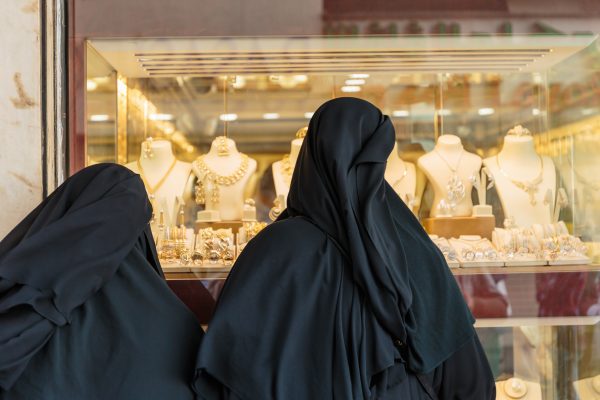“Yet as for those who hoard up gold and silver and do not spend it in the path of God — give them heavy tidings of a most painful torment — on a Day Hereafter when gold and silver shall be heated in the Fire of Hell…” (Quran: Sûrat Al-Tawbah, 9:34-35)
“Yet as for those who hoard up gold and silver and do not spend it in the path of God — give them heavy tidings of a most painful torment — on a Day Hereafter when gold and silver shall be heated in the Fire of Hell…” (Quran: Sûrat Al-Tawbah, 9:34-35)
Is Zakat due on gold?
The short answer:
Yes. Gold is the very definition of “increasing” wealth, and Zakat comes due on all growing and producing wealth at the threshold (niṣâb) and timeline the Prophet, on him be peace, fixed for each Zakatable asset-type possessed by every able, sole owner. (See Is Zakat Due on All Wealth? and also What Requirements Qualify Wealth for Zakat?)
Why has Allah imposed Zakat on gold?
Allah has forbidden hoarding of gold in severe terms in the Quran because of its essential value to the economic life of the community and because that obsession quickly becomes a sickness of the human soul.
“Yet as for those who hoard up gold and silver and do not spend it in the path of God — give them heavy tidings of a most painful torment — on a Day Hereafter when gold and silver shall be heated in the Fire of Hell. Then their foreheads and their sides and their backs will be branded with it [and it shall be said to them]: This is what you have hoarded up for yourselves! So taste now what you used to hoard up!” (Quran: Sûrat Al-Tawbah, 9:34-35)
Hence, the Prophet, on him be peace, instructed Muslim guardians to invest the money of the orphans in their care so annual Zakat payments would not consume it before they come of age and assume investment control of it.

The detailed answer:
Gold in all its forms — coin, bullion, and handicraft — and whether held as personal or business wealth, accrues due Zakat every lunar year (ḥawl) that it reaches its established Zakat niṣâb (minimum threshold) of 85 grams, excepting jewelry women use to adorn themselves. (See Is There Zakat on Jewelry?)
There is unanimous agreement (ijma‘) among Muslim scholars that any Muslim who owns gold or silver must pay Zakat on “it” as currency. This means there is Zakat on all money. The Prophet, on him be peace, said: “On silver, 2.5% is due.”
There is also virtual consensus among the scholars based on a conglomerate of reports taken together and the statements and practices of the Companions that 20 gold dinars (gold coinage) equaled the value of 200 silver dirhams (silver coinage) and formed the niṣâb for Zakat on gold, paid at the Zakat rate of half a gold dinar on 20 gold dinars. Other reports establish that one gold dinar equaled the value of 10 silver dirhams at the time of the Prophet, on him be peace.
What measure determined the value of gold at that time?
Weight determined the value of the silver dirham and gold dinar as currency in the time of the Prophet, on him be peace. He established the weights of Makkah as the Muslims’ standard measure for currency based on the weights of the dirham and dinar of the Makkans. This remains in force for calculating Zakat’s niṣâb on gold. (See How Is Zakat Calculated on Wealth?)
Do we use the same gold weight as the Prophet, on him be peace?
Scholars, Muslims, and others have matched the exact equivalent of the gold dinar of the prophetic generation to our weights for Zakat on gold today through preserved samples of coinage called mithqal.
The second Rightly Guided Caliph and Companion ‘Umar ibn Al-Khaṭṭâb himself standardized the legal weight of the dirham and the Caliph ‘Abdul-Malik minted all coins of the realm on that legal weight. Many historians have established that 10 silver dirhams equaled a specific weight as measured against a mithqal.
“It is unanimously agreed upon since the early ages of Islam, the era of the Companions and the Successors, that … the weight of a silver dirham is equal to seven-tenths the weight of a gold dinar” (Ibn Khaldun, Al-Muqaddimah).
You can read about this in more detail here: How Is Zakat Calculated on Wealth?
Why Is Zakat on money today paid based on gold?
The Prophet, on him be peace, indexed Zakat payment to the value of the silver dirham and gold dinar of Makkah, which was the currency of the time. So those weights must remain the method of measuring gold, silver, and all our currency for Zakat payments.
Muslims, moreover, have long converted to gold as the standard weight measure for the Zakat niṣâb threshold on currency because its coinage has proven the most constant stable measure of wealth.
To use silver directly as the niṣâb standard, as some today advocate, arguing that silver’s lower threshold will benefit the poor by resulting in more Zakat payments, actually compels many poor themselves to pay Zakat, increasing their financial burden and further impoverishing them.
At noon on January 11, 2021, for example, niṣâb calculated on silver (595 gm) stands at just $481.95. This means a person with that amount of money, in all its forms combined, at the Zakat Due Date (ZDD) must pay 2.5% of it, or $12.04, in obligatory Zakat — a burdensome duty for those struggling to sustain themselves and their families.
The niṣâb for gold (85 gm) at this same time is $5,074.50, at a Zakat payment of $126.86, a fair and, therefore, moral responsibility for the wealth God has given one.
Is all women’s gold jewelry Zakat-exempt?
No. Jewelry hoarded for wealth accumulation, in excessive amounts or in extravagance, must have Zakat paid on it at 2.5% annually. Many Hanafi scholars consider gold and silver Zakatable regardless of its form. Jewelry’s Zakat-exempt status for women and its use for personal adornment, however, many scholars deem as the stronger position. (See Is There Zakat on Jewelry?)
What about gold in art or decorative use?
Gold and silver are subject to Zakat in all other forms. If gold (or silver) takes the shape of a forbidden form or use item (say, statuary, or silver or gold dinnerware) their market value is added to their gold worth and Zakat is paid on the total amount at the current 2.5% rate of gold.
How does one calculate niṣâb on gold?
This is the niṣâb equation for gold and all monetary conversion:
Gold price per gram US$ x 85 grams = Nisab (most precise)
Gold price per troy ounce US$ x 2.73295 troy oz = Nisab
(See Niṣâb and Zakat Calculation in a Nutshell)
If you need to calculate your Zakat on gold, visit our Zakat Calculator here.





